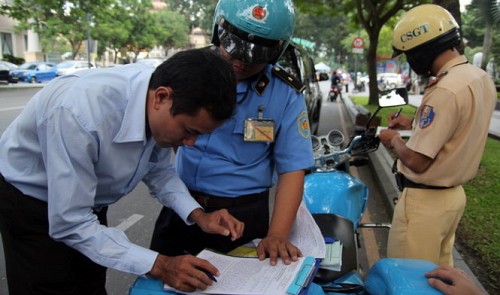Vietnamese Minister of Transport Dinh La Thang on Tuesday tasked a ministry unit with conducting studies to regularize Uber operations in Vietnam, shortly after his deputy asserted that the ridesharing app is illegal.
Minister Thang asked the ministry’s transport agency to add regulations to make Uber a legal service in Vietnam during a meeting in Hanoi, Nguyen Van Luu, head of the secretariat with the ministry, told Tuoi Tre (Youth) newspaper.
Uber’s transport business must be regulated and put under governmental management, Luu quoted the minister as saying.
“Uber charges passengers less than the traditional cabs, which benefits members of the public, so why would we not regularize the service to better manage it?” the ministry-run Giao Thong Van Tai (Transport) newspaper quoted Thang as saying.
If the transport model Uber is employing in Vietnam is not mentioned in any existing legal documents, new regulations and guidelines must be added to legalize the service, according to the minister.
Thang made his request only one day after his deputy, Nguyen Hong Truong, told a press briefing in the Vietnamese capital that Uber is illegal.
“Any transport activity which directly charges passengers but does not operate through a registered transport business is against the law on road traffic and decree on automobile transport,” Truong said.
It is worth noting that it was Minister Thang who ordered relevant agencies to prevent the law violations (if any) of Uber in Vietnam in a fiat released on November 17.
He also asked to “strengthen crackdowns on car drivers that charge passengers but do not comply with automobile transport regulations,” according to the document.
The dispatch was sent in handling a complaint by the Ho Chi Minh City Tax Association, which said the city’s taxi operators are hurt by the Uber service.
Uber customers use the app to request rides and track their reserved vehicle's location, with information including the fare and estimated arrival time made known before they get in the car.
The complete fare is automatically billed to the customer's credit card at the end of a ride, with the car owner receiving 80 percent, whereas the remaining amount goes to Uber.
Uber is a controversial service in many of the 250 cities worldwide the company has a presence in, mostly because it can offer lower fees due to the absence of regulations.
Ho Chi Minh City authorities levied civil penalties on five Uber cars following a sudden check last week.
Karun Arya, South Asia communications lead with Uber, told Tuoi Tre via email that Uber is a win-win solution for everyone: consumers have more choices, whereas drivers have greater income potential.
Arya said Uber brings competition to the transport industry, which benefits drivers, passengers and the community.
“Our platform simply connects a rider’s request to a partner from a licensed transportation company. This is fully compliant with applicable transportation laws and accredited by the local government,” he said.
Arya added Uber looks forward to meeting with local authorities to discuss how they can “work together to help transform and modernize the country’s transportation.”






















































